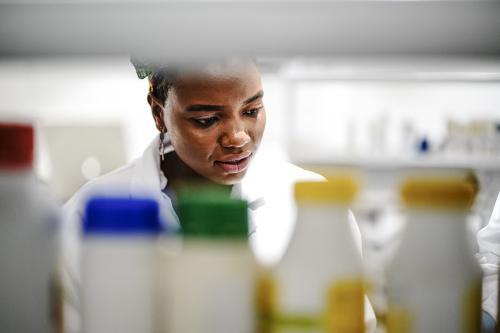Below is a viewpoint from the Foresight Africa 2022 report, which explores top priorities for the region in the coming year. Read the full chapter on African women and girls.
 Women’s rights as human rights emerged as a global issue during the United Nations Decade for Women (1976-1985). Women across different geographic, cultural, religious, racial, and class backgrounds came together as part of a global movement and worked to improve the status of women. Over subsequent decades, women in different countries used various platforms to advocate for women’s recognition and rights.
Women’s rights as human rights emerged as a global issue during the United Nations Decade for Women (1976-1985). Women across different geographic, cultural, religious, racial, and class backgrounds came together as part of a global movement and worked to improve the status of women. Over subsequent decades, women in different countries used various platforms to advocate for women’s recognition and rights.
In line with this movement, Uganda—with an approximate population of 45.74 million, 50.71 percent of whom are female—has, for over the past two decades, shown commitment towards achieving gender equality and women’s empowerment. The 1995 Constitution, on which all the country’s legislation is based, opposes laws and practices that violate women’s dignity. Importantly, its provisions aimed at protecting gender equality are based on international frameworks like The Convention on the Elimination of All Forms of Discrimination Against Women (CEDAW)—a key international agreement on women’s human rights often described as an international bill of rights for women—and the Protocol to the African Charter on Human and People’s Rights on the Rights of Women in Africa (Maputo Protocol). CEDAW and the Maputo Protocol signal a successful mainstreaming of women’s rights as human rights and impose the main obligation on member states to implement the frameworks.
The COVID-19 pandemic has highlighted the government’s inability to address women’s rights in the “private” sphere.
Despite the positive steps that have been taken in Uganda to promote gender equality and women’s empowerment, the position for women in Ugandan society is one of powerlessness influenced by a range of factors. These factors include cultural biases that unjustly stall women’s career progression in public spaces, lack of qualifications and skills (given the already-marginalized position of women in education and training), and low self-confidence.
Furthermore, the COVID-19 pandemic has highlighted the government’s inability to address women’s rights in the “private” sphere (e.g., homes). Women and girls confined in their homes during COVID-19 lockdowns experienced increases in domestic violence, and about 90,000 girls under the age of 18 were reported pregnant in Uganda. Yet, private spheres are often thought to be beyond the purview of the State—exempt from governmental scrutiny and intervention. As a result, violence against women and girls that occur within families continue to remain hidden, where perpetrators of such human rights abuses typically enjoy impunity for their actions.
It is not only women that feel the negative effects of failure to invest in women, their children’s welfare and efforts to combat poverty and achieve economic growth are similarly affected.
These biases and gaps impact women’s ability to actively participate in public spaces and generate income and contribute to the economic growth as agents of development. It is not only women that feel the negative effects of failure to invest in women, their children’s welfare and efforts to combat poverty and achieve economic growth are similarly affected. Therefore, the government—in an effort to make our communities inclusive, safe, resilient, and sustainable—should adequately invest in efforts to address these limitations and consider the following recommendations:
- Fund grassroots organizations that build the capacity of women so they can participate, both individually and collectively, in social, economic, political, and public life.
- Incorporate men and boys in trainings focused on supporting and promoting women and girls as leaders and decision makers.
- Launch a hotline to provide free counselling and legal services for people experiencing gender-based violence.
- Establish shelters for survivors of gender-based violence in all districts of Uganda and allocate sufficient resources to run the existing ones.
- Prioritize awareness programs on how to ensure women and girls are safe at home and know where they can turn for help in their communities.
- Develop gender-responsive education sector contingency plans and budgets, grounded in gender analyses of roles, risks, responsibilities, and social norms. These must consider mitigating care giving burdens, heightened risks of gender-based violence, and early pregnancy.





Commentary
It is not yet Uhuru for the women of Uganda
February 24, 2022